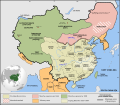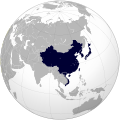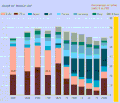Portal:Asia

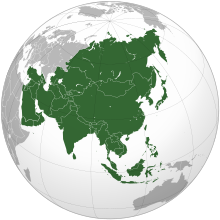 Asia (/ˈeɪʒə/ ⓘ AY-zhə, UK also /ˈeɪʃə/ AY-shə) is the largest continent in the world by both land area and population. It covers an area of more than 44 million square kilometers, about 30% of Earth's total land area and 8% of Earth's total surface area. The continent, which has long been home to the majority of the human population, was the site of many of the first civilizations. Its 4.7 billion people constitute roughly 60% of the world's population. Asia shares the landmass of Eurasia with Europe, and of Afro-Eurasia with both Europe and Africa. In general terms, it is bounded on the east by the Pacific Ocean, on the south by the Indian Ocean, and on the north by the Arctic Ocean. The border of Asia with Europe is a historical and cultural construct, as there is no clear physical and geographical separation between them. It is somewhat arbitrary and has moved since its first conception in classical antiquity. The division of Eurasia into two continents reflects East–West cultural, linguistic, and ethnic differences, some of which vary on a spectrum rather than with a sharp dividing line. A commonly accepted division places Asia to the east of the Suez Canal separating it from Africa; and to the east of the Turkish Straits, the Ural Mountains and Ural River, and to the south of the Caucasus Mountains and the Caspian and Black seas, separating it from Europe. China and India traded places as the largest economies in the world from 1 to 1800 CE. China was a major economic power for much of recorded history, with the highest GDP per capita until 1500. The Silk Road became the main east–west trading route in the Asian hinterlands while the Straits of Malacca stood as a major sea route. Asia has exhibited economic dynamism as well as robust population growth during the 20th century, but overall population growth has since fallen. Asia was the birthplace of most of the world's mainstream religions including Hinduism, Zoroastrianism, Judaism, Jainism, Buddhism, Confucianism, Taoism, Christianity, Islam, Sikhism, as well as many other religions. (Full article...) Featured article Macedonia (/ˌmæsɪˈdoʊniə/ ⓘ MASS-ih-DOH-nee-ə; Greek: Μακεδονία), also called Macedon (/ˈmæsɪdɒn/ MASS-ih-don), was an ancient kingdom on the periphery of Archaic and Classical Greece, which later became the dominant state of Hellenistic Greece. The kingdom was founded and initially ruled by the royal Argead dynasty, which was followed by the Antipatrid and Antigonid dynasties. Home to the ancient Macedonians, the earliest kingdom was centered on the northeastern part of the Greek peninsula, and bordered by Epirus to the southwest, Illyria to the northwest, Paeonia to the north, Thrace to the east and Thessaly to the south. Before the 4th century BC, Macedonia was a small kingdom outside of the area dominated by the great city-states of Athens, Sparta and Thebes, and briefly subordinate to Achaemenid Persia. During the reign of the Argead king Philip II (359–336 BC), Macedonia subdued mainland Greece and the Thracian Odrysian kingdom through conquest and diplomacy. With a reformed army containing phalanxes wielding the sarissa pike, Philip II defeated the old powers of Athens and Thebes in the Battle of Chaeronea in 338 BC. Philip II's son Alexander the Great, leading a federation of Greek states, accomplished his father's objective of commanding the whole of Greece when he destroyed Thebes after the city revolted. During Alexander's subsequent campaign of conquest, he overthrew the Achaemenid Empire and conquered territory that stretched as far as the Indus River. For a brief period, his Macedonian Empire was the most powerful in the world – the definitive Hellenistic state, inaugurating the transition to a new period of Ancient Greek civilization. Greek arts and literature flourished in the new conquered lands and advances in philosophy, engineering, and science spread across the empire and beyond. Of particular importance were the contributions of Aristotle, tutor to Alexander, whose writings became a keystone of Western philosophy. (Full article...)Selected Country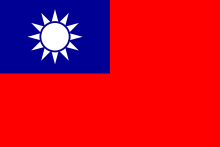 Taiwan, officially the Republic of China (ROC), is a country in East Asia. It is located at the junction of the East and South China Seas in the northwestern Pacific Ocean, with the People's Republic of China (PRC) to the northwest, Japan to the northeast, and the Philippines to the south. The territories controlled by the ROC consist of 168 islands with a combined area of 36,193 square kilometres (13,974 square miles). The main island of Taiwan, also known as Formosa, has an area of 35,808 square kilometres (13,826 square miles), with mountain ranges dominating the eastern two-thirds and plains in the western third, where its highly urbanized population is concentrated. The capital, Taipei, forms along with New Taipei City and Keelung the largest metropolitan area. With around 23.9 million inhabitants, Taiwan is among the most densely populated countries. Taiwan has been settled for at least 25,000 years. Ancestors of Taiwanese indigenous peoples settled the island around 6,000 years ago. In the 17th century, large-scale Han Chinese immigration began under a Dutch colony and continued under the Kingdom of Tungning, the first predominantly Han Chinese state in Taiwanese history. The island was annexed in 1683 by the Qing dynasty of China and ceded to the Empire of Japan in 1895. The Republic of China, which had overthrown the Qing in 1912, took control following the surrender of Japan in 1945. Japan renounced sovereignty over Taiwan in 1952. The immediate resumption of the Chinese Civil War resulted in the loss of the Chinese mainland to Communist forces, who established the People's Republic of China, and the flight of the ROC central government to Taiwan in 1949. The effective jurisdiction of the ROC has since been limited to Taiwan, Penghu, and smaller islands. (Full article...)Featured biographyFreida Selena Pinto (born 18 October 1984) is an Indian actress who has appeared mainly in American and British films. Born and raised in Mumbai, Maharashtra, she resolved at a young age to become an actress. As a student at St. Xavier's College, Mumbai she took part in amateur plays. After graduation, she briefly worked as a model and then as a television presenter. Pinto rose to prominence with her film debut in the drama Slumdog Millionaire (2008), winning a SAG Award and earning a nomination for the BAFTA Award for Best Supporting Actress. She earned critical acclaim for her roles in Miral (2010), Trishna (2011), and Desert Dancer (2014). She also saw commercial success with the science fiction film Rise of the Planet of the Apes (2011), and the epic fantasy action film Immortals (2011). Pinto's other notable roles include You Will Meet a Tall Dark Stranger (2010), Love Sonia (2018), Hillbilly Elegy (2020), and Mr. Malcolm's List (2022). She also starred in the Showtime miniseries Guerrilla (2017), and had a recurring role in the Hulu series The Path (2018). (Full article...)General imagesThe following are images from various Asia-related articles on Wikipedia. Featured picture Credit: Daniel Bachler A photo of two maiko (apprentice geisha), with the typical make-up clearly visible, leaving portions of the nape uncovered. This is done to accentuate what is a traditionally erotic area. The white face make-up is supposed to resemble a mask, and a line of bare skin around the hairline helps create that illusion. Established geisha generally wear full white face makeup characteristic of maiko only during special performances.
Did you know...
Updated: 6:33, 14 February 2024 In the news
Related portalsMajor Religions in Asia Middle East Central Asia and Surroundings Indian Subcontinent Southeast Asia East Asia Selected panorama
The night skyline of Hong Kong, Victoria Harbour and Kowloon, as seen from Victoria Peak, the tallest mountain on Hong Kong Island. Hong Kong is located on China's south coast on the Pearl River Delta, and borders Guangdong province in the north and faces the South China Sea in the east, west and south. It has a population of 6.9 million people, and is one of the most densely populated areas in the world. TopicsCategoriesAssociated WikimediaThe following Wikimedia Foundation sister projects provide more on this subject:
More portalsShortcuts to this page: Asia portal • P:ASIA Purge server cache |













































